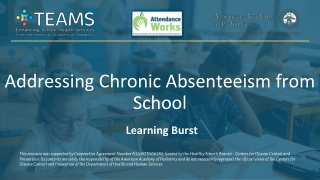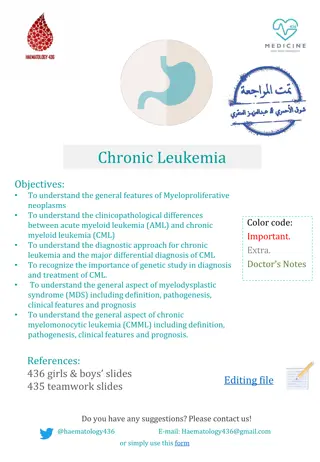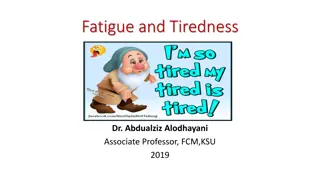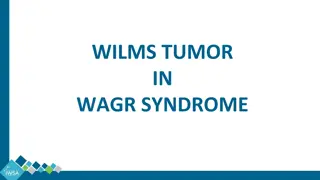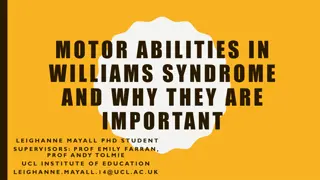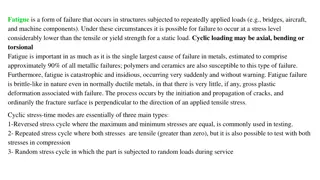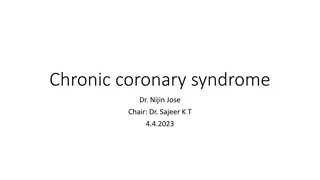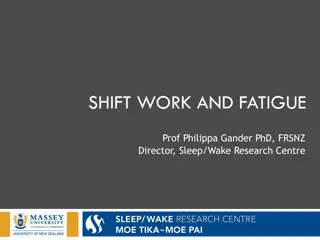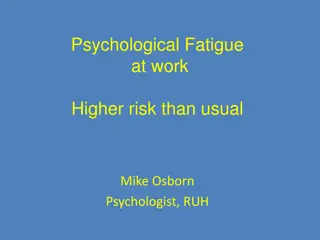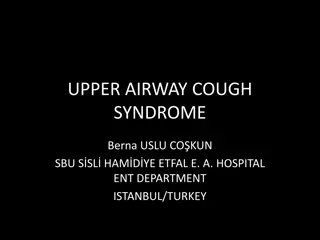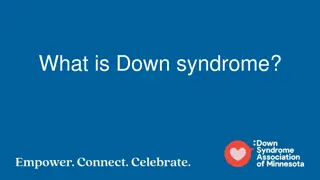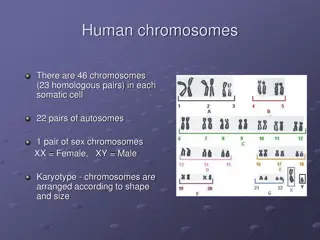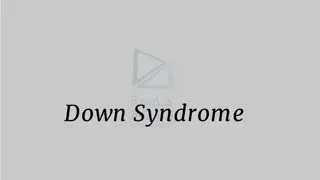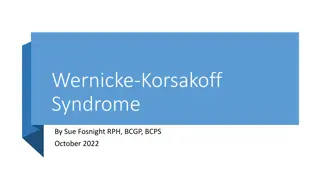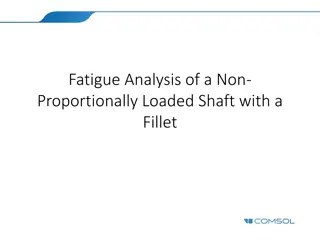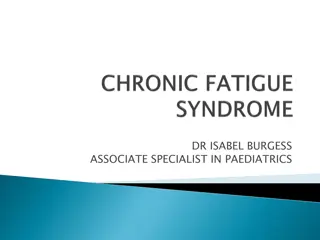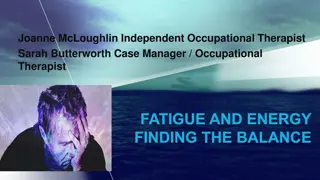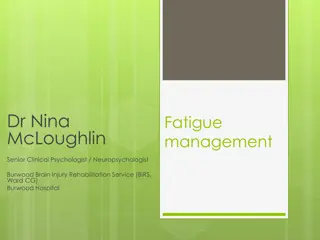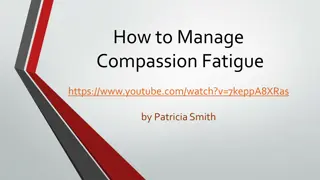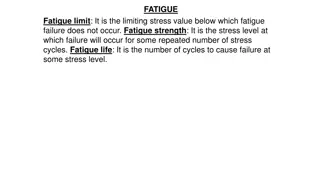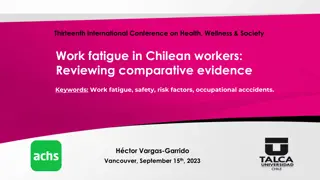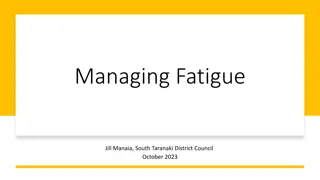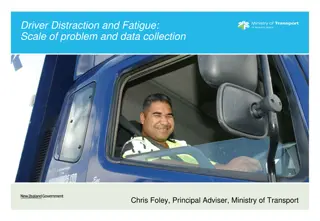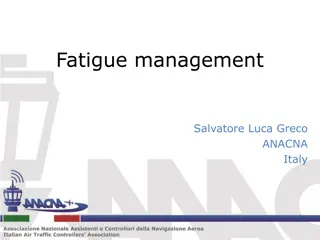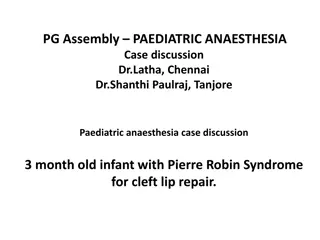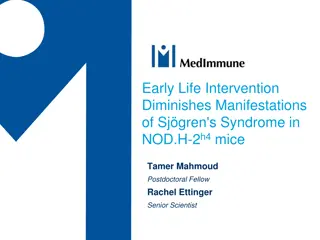Addressing Chronic Absenteeism in Schools: Learning Burst Summary
Chronic absenteeism in schools is a significant issue impacting students' academic success and overall well-being. This learning burst resource delves into understanding chronic absenteeism, its causes, and evidence-based interventions to improve attendance and reduce inequities. By collaborating wi
1 views • 22 slides
Managing Human Fatigue Risk Through Safety and Wearable Technology
Explore the framework of human fatigue, the costs associated with fatigue-related accidents, performance impairments due to sleep deprivation, and the monetary losses incurred by businesses. Learn about solutions and systems integrating technology to monitor and manage human fatigue risk effectively
0 views • 20 slides
Overview of Chronic Leukemia and Myeloproliferative Neoplasms
This comprehensive guide covers the general features, diagnostic approach, and clinicopathological variances between acute myeloid leukemia (AML) and chronic myeloid leukemia (CML), along with insights into myelodysplastic syndrome (MDS) and chronic myelomonocytic leukemia (CMML). It emphasizes the
1 views • 9 slides
CDC National Center for Chronic Disease Prevention and Health Promotion Information Call
This National Center for Chronic Disease Prevention and Health Promotion initiative aims to enhance education and awareness efforts for chronic diseases lacking dedicated resources. The NOFO offers funding opportunities for projects addressing various chronic conditions, emphasizing prevention and p
0 views • 33 slides
Understanding Fatigue: Definitions, Causes, and Management
Fatigue is defined as an unpleasant symptom that affects an individual's normal functioning capacity. It can manifest as tiredness, weakness, or lack of energy. Common causes of fatigue include sleep loss, heavy physical or mental work, and chronic conditions like Chronic Fatigue Syndrome. The manag
3 views • 36 slides
Implementation of Redi Fatigue Management System at OK Tedi Mine
Significant incidents related to the operation of vehicles and mobile equipment at OK Tedi Mine prompted the exploration of more effective fatigue management controls. The Redi Fatigue Risk Management Process, utilizing wearables and personalized fatigue prediction, aims to reduce fatigue-related in
0 views • 7 slides
Recognizing and Addressing Compassion Fatigue, Burnout, and Role Overload in Caregivers
Understanding the concepts of compassion fatigue, burnout, and role overload is crucial for caregivers to prevent and manage the negative impacts of their work. Compassion fatigue involves emotional and physical exhaustion, while burnout results in a sense of overwhelming stress and detachment. Role
0 views • 15 slides
Neuroleptic Malignant Syndrome and Serotonin Syndrome Overview
This educational material provides an in-depth understanding of Neuroleptic Malignant Syndrome (NMS) and Serotonin Syndrome (SS) including their background, pathophysiology, clinical characteristics, differential diagnosis, risk factors, and treatment approaches. It also explores the historical back
3 views • 53 slides
Understanding Wilms Tumor in WAGR Syndrome
WAGR syndrome is a rare genetic condition associated with Wilms Tumor, aniridia, and developmental delays. Wilms Tumor is a form of kidney cancer mostly affecting children and is linked to genetic disorders like WAGR syndrome. The risk of Wilms Tumor is higher in children with WAGR syndrome, with po
1 views • 14 slides
Understanding Fiber Characteristics in Fiber Optics and Laser Instrumentation
This module explores the mechanical characteristics such as strength, static fatigue, and dynamic fatigue of glass fibers in fiber optics. It discusses the cohesive bond strength of glass fibers, static fatigue under humid conditions, and dynamic fatigue during installation and operation. The transm
0 views • 34 slides
Motor Abilities in Williams Syndrome and Their Importance
Motor abilities play a crucial role in the developmental journey of individuals with Williams Syndrome. From simple reflex movements to fine and gross motor skills, these abilities impact daily living, academic achievements, and overall cognitive and physical growth. Research on motor skills in both
0 views • 20 slides
Understanding Fatigue Failure in Structural Materials
Fatigue failure is a common form of structural failure caused by repetitive loading, especially in metals but also affecting polymers and ceramics. This type of failure can occur at stress levels much lower than the material's static strength, often leading to sudden and catastrophic breaks without
0 views • 9 slides
Understanding Chronic Coronary Syndrome: Causes, Symptoms, and Management
Chronic coronary syndrome involves a dynamic process of atherosclerotic plaque accumulation and functional alterations in coronary circulation. It includes various clinical scenarios such as stable angina, asymptomatic ischemia, prior myocardial infarction, and more. The condition can be modified by
0 views • 131 slides
Managing Fatigue and Shift Work: Impact on Safety and Wellbeing
Understanding the legal requirements, effects of fatigue and shift work, and ways to manage fatigue is crucial for ensuring workplace safety and employee wellbeing. Fatigue, a state of reduced performance capability, can result from various factors, including sleep loss and workload. Shift work pose
6 views • 19 slides
Understanding Psychological Fatigue at Work: Insights from Mike Osborn, Psychologist
Small behaviors and everyday experiences can significantly impact our health, especially in high-performance work environments like hospitals. Psychological fatigue can lead to cognitive disruption, misplaced guilt, and decreased well-being among staff. It is essential to prioritize self-compassion,
0 views • 19 slides
Understanding Upper Airway Cough Syndrome and Chronic Cough Causes
Upper Airway Cough Syndrome (UACS) encompasses conditions like rhinitis and sinusitis, leading to chronic cough lasting more than 8 weeks. Common causes include asthma, GERD, and airway diseases. Differences in terminology between countries exist, with UACS being more widely accepted in the US. The
0 views • 42 slides
Understanding Chromosomal Abnormalities and Syndromes
Human cells have 22 pairs of autosomes and one pair of sex chromosomes, totaling 46. Karyotypes help diagnose chromosomal abnormalities by aligning chromosomes in size order. Nondisjunction during meiosis can lead to abnormal chromosome numbers in gametes. Disorders like Down Syndrome, XYY Syndrome,
0 views • 30 slides
Understanding Down Syndrome: Causes, Effects, and Characteristics
Down syndrome, also known as Trisomy 21, is a genetic condition caused by the presence of an extra 21st chromosome. Discovered by Dr. John Langdon Down in 1866, this condition affects individuals in various ways, influencing their development and abilities. People with Down syndrome may learn skills
0 views • 10 slides
Understanding Chromosomal Disorders and Syndromes in Humans
Human chromosomes play a crucial role in determining genetic traits and health conditions. An extra copy of chromosome 21 leads to Down syndrome, while conditions like Klinefelter's syndrome, Turner's syndrome, Trisomy 13, 18, and 23 have distinct symptoms and implications. Trisomies result from abn
0 views • 20 slides
Understanding Down Syndrome: Types, Characteristics, and Impacts
Down syndrome is a genetic condition caused by an extra chromosome, typically chromosome 21. This leads to physical and cognitive challenges, with individuals exhibiting unique abilities. The syndrome presents with distinctive physical features, such as flattened face, almond-shaped eyes, and poor m
1 views • 14 slides
Understanding Wernicke-Korsakoff Syndrome: Overview and Clinical Considerations
Wernicke-Korsakoff Syndrome (WKS) comprises Wernicke's Encephalopathy (WE) and Korsakoff Syndrome. WE presents with altered mental status, ocular signs, and ataxia, while Korsakoff Syndrome manifests as amnesia and confabulations. Untreated WE can progress to Korsakoff Syndrome in about 80% of cases
0 views • 52 slides
Fatigue Analysis of Non-Proportionally Loaded Shaft with a Fillet
This analysis focuses on high-cycle fatigue in a non-proportionally loaded structure, using stress-based models Findley, Matake, and Dang Van. Non-proportional loading, where loads affect the structure out of phase, is discussed along with the selection of fatigue models based on load type, expected
0 views • 5 slides
Notch Approximation for Low-Cycle Fatigue Analysis in Structural Components
Structural components subjected to multi-axial cyclic loading can be analyzed for low-cycle fatigue using notch approximation. By transforming elastic response into an elastoplastic state, the computation time is reduced, and fatigue evaluation is done based on the Smith-Watson-Topper model. Strain-
0 views • 4 slides
Comprehensive Overview of Chronic Fatigue Syndrome in Pediatrics
Associate Specialist in Pediatrics, Dr. Isabel Burgess, provides a detailed insight into Chronic Fatigue Syndrome (CFS) in children. The diagnosis, symptoms, management principles, and impact on daily life are discussed, covering aspects from mild to very severe cases. Key signs such as debilitating
0 views • 28 slides
Understanding Fatigue: Causes, Symptoms, and Management
Fatigue is a distressing condition affecting physical, emotional, and cognitive aspects, often not alleviated by rest. It can be a common symptom after brain injury, spinal cord injury, and visual impairment. Symptoms include flu-like symptoms, sleep disturbances, cognitive difficulties, and emotion
0 views • 15 slides
Ublituximab Associated With Improvement in Fatigue: Results from ULTIMATE I and II
A study presented at the Consortium of Multiple Sclerosis Centers showed that ublituximab significantly improved fatigue in patients with multiple sclerosis. The research highlighted the impact of MS-related fatigue on patients' quality of life and daily activities. ULTIMATE I and II trials compared
0 views • 14 slides
Practical Techniques for Managing Fatigue in Clients with Neurological Conditions
This session by Dr. Nina McLoughlin, a Senior Clinical Psychologist/Neuropsychologist, focuses on practical fatigue management techniques for clients with brain injuries, strokes, and other neurological conditions. Emphasizing the importance of addressing sleep as the primary intervention point, the
0 views • 33 slides
Managing Compassion Fatigue: Tips and Strategies by Patricia Smith
Symptoms, patterns, and solutions for managing compassion fatigue are discussed in a video by Patricia Smith, founder of the Compassion Fatigue Awareness Project. Learn how to recognize and address symptoms like isolation and emotional outbursts, identify patterns that can lead to compassion fatigue
0 views • 5 slides
Understanding Fatigue in Materials Engineering
Fatigue in materials engineering is a phenomenon where failure occurs under repeated stress cycles. Factors influencing fatigue life include mean stress, surface effects, thermal and corrosion fatigue. Creep behavior at elevated temperatures is also crucial. Recognizing these aspects is vital for de
0 views • 11 slides
Work Fatigue in Chilean Workers: Understanding Impacts and Risk Factors
Fatigue affects a significant portion of the workforce, impacting safety, health, and well-being. This study explores work fatigue in Chilean workers, examining its prevalence, causes, and relationship to occupational accidents. Factors like shift work, workload, sleep disturbances, and health risks
0 views • 15 slides
Understanding and Managing Fatigue: Insights and Risks
Fatigue is a state of exhaustion, both physically and mentally, that can lead to decreased alertness and increased crash risks. Factors contributing to fatigue include inadequate sleep, reliance on external stimuli for wakefulness, and the nature of driving during risk periods. Recognizing signs of
0 views • 13 slides
Addressing Driver Distraction and Fatigue for Safer Journeys in New Zealand
Safer Journeys in New Zealand focuses on reducing the impact of driver fatigue and addressing distractions to improve road safety. By collecting data on crashes related to fatigue and distraction, the Ministry of Transport aims to better understand the scope of the problem and implement effective po
0 views • 4 slides
Understanding Fatigue Management and Restorative Sleep
Fatigue, as a physiological state affecting performance, is a significant concern in various contexts. This content delves into the causes and consequences of fatigue, emphasizing the importance of managing it effectively. Additionally, it discusses the need for restorative sleep, outlining the stag
0 views • 27 slides
Gulf War Veterans Disability Compensation Guide
Qualifying Gulf War veterans may be entitled to disability compensation for certain undiagnosed illnesses, chronic disability patterns, and presumptive diseases. Eligibility requirements include meeting specific conditions related to service-related disabilities or illnesses. The disabilities must f
0 views • 12 slides
Understanding Asphalt Binder Fatigue Characterization
This comprehensive study delves into the fatigue characterization of asphalt binders using Linear Amplitude Sweep (LAS) testing. It covers various aspects such as theoretical foundations, testing methods, equipment used, and analysis of results. Additionally, it explores Superpave specifications, bi
0 views • 35 slides
Paediatric Anaesthesia Case Discussion: Challenges of Anaesthetizing an Infant with Pierre Robin Syndrome
Pierre Robin Syndrome (PRS) presents challenges in paediatric anaesthesia, especially in infants undergoing procedures like cleft lip repair. PRS is characterized by micrognathia, glossoptosis, and respiratory distress. Other syndromes associated with cleft lip include Treacher Collins syndrome, Gol
0 views • 56 slides
Understanding Imposter Syndrome: Causes, Effects, and Overcoming Strategies
Imposter Syndrome is characterized by feelings of inadequacy despite evidence of success, chronic self-doubt, and fear of being exposed as a fraud. It affects individuals' work performance, leads to avoidance of additional duties, assigns success to external factors, and can result in burnout. Howev
0 views • 10 slides
Understanding and Managing Fatigue in the Workplace
Fatigue is a state of physical and mental exhaustion that can lead to errors and accidents in the workplace. It is caused by a reduction in alertness and can be triggered by factors like extended working hours and high mental or physical demands. Recognizing the signs of fatigue, such as constant sl
0 views • 10 slides
Early Life Intervention Diminishes Sjögren's Syndrome Manifestations in Mice
Early life intervention has been shown to reduce the clinical manifestations of Sjögren's syndrome in NOD.H-2h4 mice, which mimic key features of the human autoimmune disease. The syndrome is characterized by salivary gland autoantibodies, ectopic lymphoid follicles, reduced salivary and tear flow,
0 views • 19 slides
Understanding Addiction as a Chronic Disease
Explore the concept of addiction as a chronic disease, distinguishing between acute and chronic conditions, and delving into personal stories that shed light on living with chronic illnesses. Discover why addiction is considered a chronic disease and how individuals cope with long-term health challe
0 views • 17 slides
